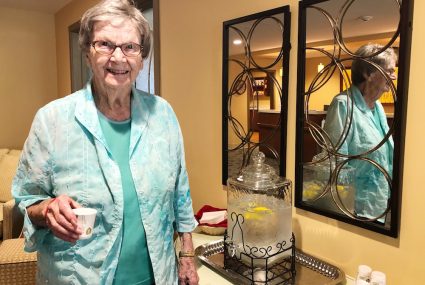Heat stroke is a very real risk for everyone, but seniors are especially vulnerable. A recent University of Chicago Medical Center study found that 40% of heat-related fatalities in the U.S. were among people over 65. So, why are older people so susceptible to heat stroke?
Why seniors are prone to heat-related illness
As we age, our ability to notice changes in body temperature decreases, due to a change in the way our bodies store fat. This means that if your loved one is overheated, they might not even be aware of it themselves. Seniors also don’t sweat as much, which makes it harder for their bodies to regulate internal temperature. There are also a number of medical conditions or treatments that may make them prone to heat illness, such as salt-restricted diets, medication that reduces the amount of sweat, or dehydration.
Signs of heat exhaustion in seniors
You can keep your loved one safe when you know the signs of heat exhaustion. When you know what to watch for, you can take action right away. Early symptoms of heat exhaustion are dizziness, headache, or muscle cramps. As it progresses, they may experience nausea, vomiting, or fainting.
If your loved one experiences these early symptoms, it’s important to cool them down as quickly as possible. Have them lie down in a cool spot or get them in front of a fan. Then give them some water or other cool fluids and, if you have access to it, put them in a cool bath.
If it progresses to heat stroke, which is much more serious, they may also have breathing problems, rapid heartbeat, or chest pain. If you notice any signs of heat stroke, call 911. It’s critical to seek medical attention right away.
How to prevent heat stroke for seniors
Thankfully, heat illness is something can often be prevented. It all starts with preventing dehydration. It’s vitally important for seniors to stay hydrated during the hot summer months. They can do this by making sure they drink water or juice at every meal and sipping on fluids throughout the day. It’s important to avoid alcohol or caffeine as well since they both can cause dehydration. Remember, the body starts to feel thirsty when you’re already dehydrated, so they should make it a goal to avoid the sensation of thirst.
The second tip is to make sure they are dressed for the weather. When it’s hot out, you don’t want to layer on heavy fabrics. On hot days, aim for lightweight fabrics in light colors, loose fitting garments, and always wear a hat.
When possible, encourage your loved one to stay indoors when it gets too hot. The hottest time of day is typically between 10am-6pm, so plan any outdoor activities outside of these hours. Of course, air conditioned environments are best, so try to find cool places to hang out. If they don’t have air conditioning at home, take them to a community centre, library, mall, or other public space where they can keep cool during the hottest part of the day.
When seniors are outside in the heat, make sure they take it easy. They should avoid any strenuous exercise in the heat, so long walks or exercise classes outdoors are not recommended. Keep walks to early morning or later in the evening if possible. When they do sit outside to enjoy the weather, stick to shady spots and avoid direct sunlight.
When you recognize the symptoms of heat illness, it’s much easier to keep your loved ones safe. Make sure they also know the steps they can take to prevent it, so they can fully enjoy the sunny weather.
At Bria Communities, we take extra steps to ensure all our residents are safe and comfortable on hot summer days. Each of our residences features sets up a hydration station in a high traffic area of the building, which typically feature ice water (usually with slices of lemon, lime, orange) and often a second option like lemonade. Glasses are kept close by and residents are encouraged to pour themselves a cool drink every time they pass by the station. Our hydration stations get set up in June and stay up through December.
Our outdoor areas, such as courtyards and rooftop gardens, always include shady spaces where our residents can sit comfortably and enjoy the outdoors without being in direct sunlight. In addition, our recreation staff are always thinking about the well-being of our residents. On summer bus trips to the beach, local gardens, and parks they always bring drinks to share with everyone.

Comments